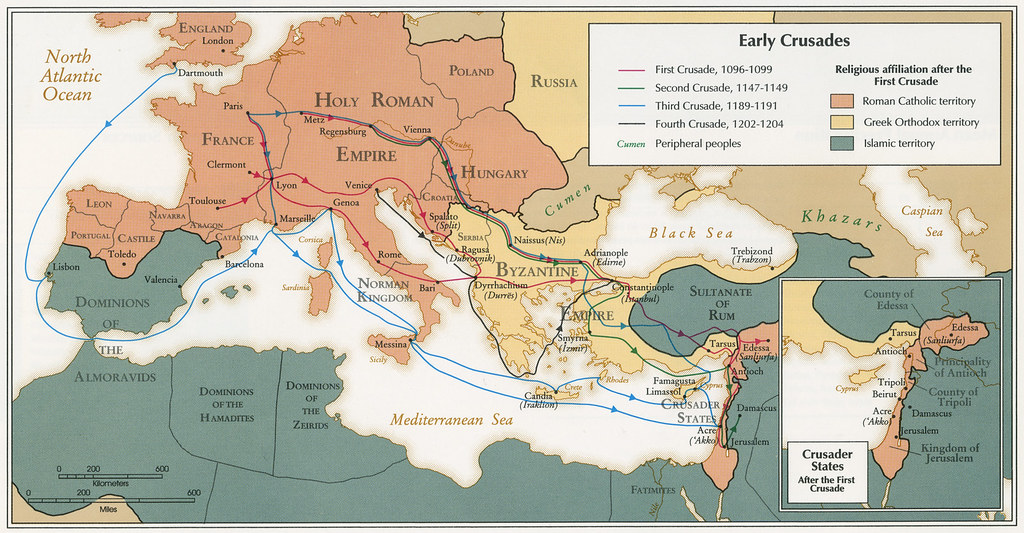Once upon a time, in the embrace of the sun-drenched Mediterranean, a land known as Greece emerged, flaunting its rich heritage and mythical tales. Oh, how the gods and goddesses danced and frolicked in its emerald-tinged valleys, and how poets adorned their celestial verses with its majestic marble columns! However, as the tides of time washed over this enchanting landscape, a dark storm brewed, at odds with its cultural splendor. This tumultuous era, known as the Crusades and Ottoman Rule, hurled Greece into the clutches of adversity, testing its resilience and leaving an indelible mark on its history. Within those turbulent boundaries, Greece’s trials and triumphs came to be, painting a poignant picture of perseverance in the face of oppression. Respectfully, let us navigate through these tumultuous chapters, weaving together the intricate threads of Greece’s journey – one that transcends time, embodying both the weight of sorrow and the audacity of hope.
The Legacy of the Crusades: Shaping Greece’s History and Identity
The intertwining history of Greece and the Crusades is a fascinating tale of perseverance, hardship, and cultural transformation. As the crusaders embarked on their holy expedition to the Holy Land, their footprints in Greece left a lasting impact on the nation’s history and identity. However, the journey was not without its challenges.
The Byzantine Empire at the crossroads: With the arrival of the crusaders, Greece found itself caught between two powers – the Latin West and the Byzantine East. The clash of cultures and ideologies brought about significant political and social upheaval. The once mighty Byzantine Empire struggled to maintain control over its territories, and Greece became a battleground for conflicting ambitions.
- The Fourth Crusade: One of the most pivotal chapters in Greece’s history was the violent sack of Constantinople by the Fourth Crusade in 1204. This shocking event shattered the Byzantine Empire and plunged Greece into a period of Latin rule known as the Frankish Principality of Achaea.
- The Rise and Fall of Ottoman Rule: The aftermath of the Crusades witnessed the emergence of another powerful force – the Ottoman Empire. Greece gradually fell under Ottoman domination, enduring centuries of Ottoman rule. This period marked significant societal changes and religious transformations as Greek Orthodox Christians navigated the challenges of living under Muslim rule.
Shaping Greece’s identity: While the Crusades and subsequent Ottoman rule presented trials for Greece, they also left an indelible mark on its history and identity. The adversity strengthened Greek resolve and fostered a deep sense of cultural preservation. The Orthodox Church became a symbol of resistance, providing a unifying force for Greeks throughout the centuries. Historical memories of the Crusades and Ottoman rule continue to shape Greece’s national narrative, serving as a reminder of the nation’s resilience in the face of adversity.

Understanding the Impact of Ottoman Rule on Greece’s Cultural, Political, and Economic Landscape
Centuries of Ottoman rule left an indelible mark on Greece’s cultural, political, and economic landscape. The impact of this rule was a complex interplay between resistance, assimilation, and transformation.
On a cultural level, Greece experienced a fusion of Eastern and Western influences. The Ottoman Empire’s rich artistic heritage, with its intricate ornamental designs and architectural marvels, began to permeate Greek culture. Greek cuisine, for instance, adopted elements of Ottoman gastronomy, such as the beloved baklava and kebabs. However, this cultural assimilation was not without its challenges, as Greece’s deep-rooted Orthodox Christian faith clashed with the predominantly Muslim Ottoman rule. The long-standing battle between Christianity and Islam during the Crusades further intensified this tension, leaving Greece in a religious and cultural limbo, struggling to define its own identity.
In addition to the cultural shift, Ottoman rule also had profound political implications for Greece. The once proud Greek city-states succumbed to the centralization of power under the Ottoman Empire. Local governance was replaced by Ottoman administrators, leading to a decline in political power and autonomy. However, this period of subjugation also fueled a spirit of resistance and longing for independence among the Greek people. Revolts and uprisings became the emblematic symbols of a nation yearning for its freedom from Ottoman rule.
Economically, Ottoman domination brought both prosperity and hardship to Greece. The Ottoman Empire’s strategic location facilitated trade routes, opening doors to new markets and economic opportunities. Greek merchants capitalized on this advantageous position, amassing wealth and expanding their mercantile networks. However, this economic growth also came at a cost. The burden of high taxes and the monopolization of key industries by Ottoman elites stifled the development of a robust Greek economy. The trade-off between economic benefits and stifling restrictions laid the foundation for Greece’s struggle towards economic independence in later years.

Preserving Greece’s Rich Heritage: Challenges and Strategies for Restoration and Conservation
Greece’s rich heritage stands as a testimony to its ancient past, but it has not been free from challenges throughout history. One of the most pivotal periods that left an indelible mark on the country was the era of the Crusades and the subsequent Ottoman rule. These tumultuous times brought about immense trials for Greece, testing the resilience of its cultural treasures and putting its architectural marvels in jeopardy.
Our journey through history unveils the significant challenges faced by Greece during the Crusades and Ottoman rule, and the strategies employed to preserve its invaluable heritage. The Crusades, characterized by armed conflict, invasions, and cultural clashes with the Byzantine Empire, had a profound impact on Greek monuments and historical sites. Churches, fortresses, and castles endured extensive damage, as they were often targeted during the conflicts. The Ottoman rule that followed brought with it a different set of challenges, as cultural assimilation and neglect threatened the survival of Greece’s architectural gems.
-
Bold strategies such as:
- Preserving damaged structures through meticulous restoration work
- Engaging in international collaborations for funding and expertise
-
Tireless efforts to:
- Document and catalog historical artifacts
- Promote awareness and appreciation of Greece’s cultural heritage
Despite the immense challenges faced by Greece, the country’s determination to safeguard its remarkable heritage has been unwavering. By exploring the trials of Greece during the Crusades and Ottoman rule, we can learn valuable lessons about restoration and conservation, ensuring that the rich heritage of Greece continues to inspire future generations.

Promoting Reconciliation and Understanding: Recommendations for Fostering Peace and Cultural Exchange
Promoting Reconciliation and Understanding
Crusades and Ottoman Rule: The Trials of Greece
As we explore the tumultuous history of Greece, we uncover the deep-rooted trials faced by its people during the Crusades and Ottoman rule. Understanding these historical events is crucial for fostering peace and cultural exchange in the region today.
The Crusades:
- During the Crusades, Greece became a battleground for conflicting religious and political interests.
- The Greek people endured immense suffering as their lands were plundered, and their cultural and religious heritage was threatened.
- Despite the hardship, some Greek scholars managed to preserve ancient manuscripts and revive the learning that would later contribute to the Renaissance.
Ottoman Rule:
- For centuries, Greece was under the oppressive rule of the Ottoman Empire, further challenging its identity and cultural continuity.
- The Greek population experienced discrimination, heavy taxation, and the imposition of Islam on Christians.
- Resistance movements, such as the Greek War of Independence, emerged to fight against Ottoman rule, ultimately leading to the restoration of Greek sovereignty.
In embracing these historical chapters and uncovering their impact on the Greek people, we can cultivate a deeper understanding and empathy, laying the foundation for peace and cultural exchange in contemporary Greece.
Future Outlook
As we bid farewell to the tales of Greece’s tumultuous history, woven with threads of triumph and tribulations, one cannot help but reflect upon the enduring spirit that has shaped this land into what it is today. From the rise and fall of empires to the indomitable courage of ordinary people, the captivating saga of Greece serves as a testament to the resilience and tenacity of its inhabitants.
Throughout the ages, Greece has stood at the crossroads of civilizations, a battleground upon which conflicting ambitions clashed and mingled. The Crusades, with their religious fervor and thirst for glory, swept across these ancient lands, leaving indelible marks upon the landscape and its people. Yet amidst the chaos and destruction, Greece emerged as a crucible of culture, breathing life into the remnants of antiquity and paving the way for a new era.
Enter the Ottoman Empire, a force that would hold Greece in its grasp for centuries. The trials faced under Ottoman rule were as diverse as the landscape itself – from the brutal suppression of rebellion to the preservation of Greek language and culture. As the empire waxed and waned, Greece remained a melting pot of faiths and traditions, each leaving an indelible imprint upon the nation’s identity.
It is a story of heroes and heroines who defied oppression, willingly bearing the weight of their convictions. It is a story of hidden resistance, of whispered words and clandestine acts that kept the flame of Greek identity alive in the darkest of times. And through it all, the spirit of Greece burned brightly, its fervor undiminished, its hope untamed.
As we draw the curtains on this epic tale of Crusades and Ottoman rule, we cannot help but marvel at Greece’s ability to rise from the ashes, again and again. We stand in awe of the strength of a nation that cherishes its past while embracing the promise of the future. The trials of Greece, like the phoenix, have only served to strengthen its resolve, forging a nation that embodies a rich tapestry of history, culture, and resilience.
So let us bid adieu to these chapters of tumult and strife, with their poignant tales of courage and sacrifice. As we look towards the horizon, Greece stands as a testament to the human spirit – a beacon of hope, a testament to the power of unity, and a reminder that the trials of the past only serve to illuminate the path to a brighter future.

